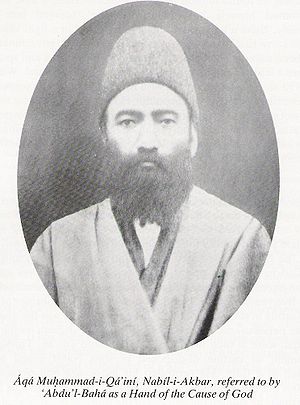
Nabíl-i-Akbar
Encyclopedia

Bahá'í Faith
The Bahá'í Faith is a monotheistic religion founded by Bahá'u'lláh in 19th-century Persia, emphasizing the spiritual unity of all humankind. There are an estimated five to six million Bahá'ís around the world in more than 200 countries and territories....
from the town of Qá'in. He is one of 19 Apostles of Bahá'u'lláh
Apostles of Bahá'u'lláh
The Apostles of Bahá'u'lláh were nineteen eminent early followers of Bahá'u'lláh, the founder of the Bahá'í Faith. The apostles were designated as such by Shoghi Effendi, the Guardian of the Bahá'í Faith, and the list was included in The Bahá'í World, Vol...
, and referred to by `Abdu'l-Bahá
`Abdu'l-Bahá
‘Abdu’l-Bahá , born ‘Abbás Effendí, was the eldest son of Bahá'u'lláh, the founder of the Bahá'í Faith. In 1892, `Abdu'l-Bahá was appointed in his father's will to be his successor and head of the Bahá'í Faith. `Abdu'l-Bahá was born in Tehran to an aristocratic family of the realm...
as a Hand of the Cause of God.
In the abjad
Abjad
An abjad is a type of writing system in which each symbol always or usually stands for a consonant; the reader must supply the appropriate vowel....
notation the name 'Muhammad' has the same numerical value as 'Nabíl'.
Nabíl-i-Akbar was the recipient of a tablet from Bahá'u'lláh, the Tablet of Wisdom.
'Abdu'l-Bahá has recounted,
- "There was, in the city of Najaf, among the disciples of the widely known mujtahid, Shaykh Murtada, a man without likeness or peer. His name was Aqa Muhammad-i-Qa'ini, and later on he would receive, from the ManifestationManifestation of GodThe Manifestation of God is a concept in the Bahá'í Faith that refers to what are commonly called prophets. The Manifestations of God are a series of personages who reflect the attributes of the divine into the human world for the progress and advancement of human morals and civilization...
, the title of Nabil-i-Akbar. This eminent soul became the leading member of the mujtahid's company of disciples. Singled out from among them all, he alone was given the rank of mujtahidIjtihadIjtihad is the making of a decision in Islamic law by personal effort , independently of any school of jurisprudence . as opposed to taqlid, copying or obeying without question....
-- for the late Shaykh Murtada was never wont to confer this degree. - "He excelled not only theology but in other branches of knowledge, such as the humanities, the philosophy of the Illuminati, the teachings of the mystics and of the Shaykhi School. He was a universal man, in himself alone a convincing proof. When his eyes were opened to the light of Divine guidance, and he breathed in the fragrances of Heaven, he became a flame of God. Then his heart leapt within him, and in an ecstasy of joy and love, he roared out like leviathan in the deep."
- (Memorials of the Faithful, p. 1)
Nabíl completed his studentship under Shaykh Murtaday-i-Ansari, and after he had obtained his sanction and blessing, Nabíl moved from Najaf to Baghdad. This teacher was the same Shaykh who refused to associate himself with the Shi'ih
Shi'a Islam
Shia Islam is the second largest denomination of Islam. The followers of Shia Islam are called Shi'ites or Shias. "Shia" is the short form of the historic phrase Shīʻatu ʻAlī , meaning "followers of Ali", "faction of Ali", or "party of Ali".Like other schools of thought in Islam, Shia Islam is...
divines gathered together to concert plans against Bahá'u'lláh during his time in Baghdad.
It has been claimed that "no one within the enclave of the Bahá'í Faith has ever surpassed the profundity of his erudition". As far as the accomplishment demanded of a Shi'ih mujtahid is concerned, his attainment was superb, but naturally he had little knowledge of the lore and the scholarship of the West. Mírzá Abu'l-Fadl
Mírzá Abu'l-Fadl
' , or ' was the foremost Bahá'í scholar who helped spread the Bahá'í Faith in Egypt, Turkmenistan, and the United States. He is one of the few Apostles of Bahá'u'lláh who never actually met Bahá'u'lláh...
of Gulpáygán, on the other hand, was well versed in Islamic studies and had a wide and comprehensive knowledge of Western thought as well. (Balyuzi)
External links
- Nabíl-i-Akbar - From Memorials of the Faithful
- Encyclopaedia Iranica article http://www.iranica.com/newsite/articles/ot_grp7/ot_nabil_akbar_20050308.html

